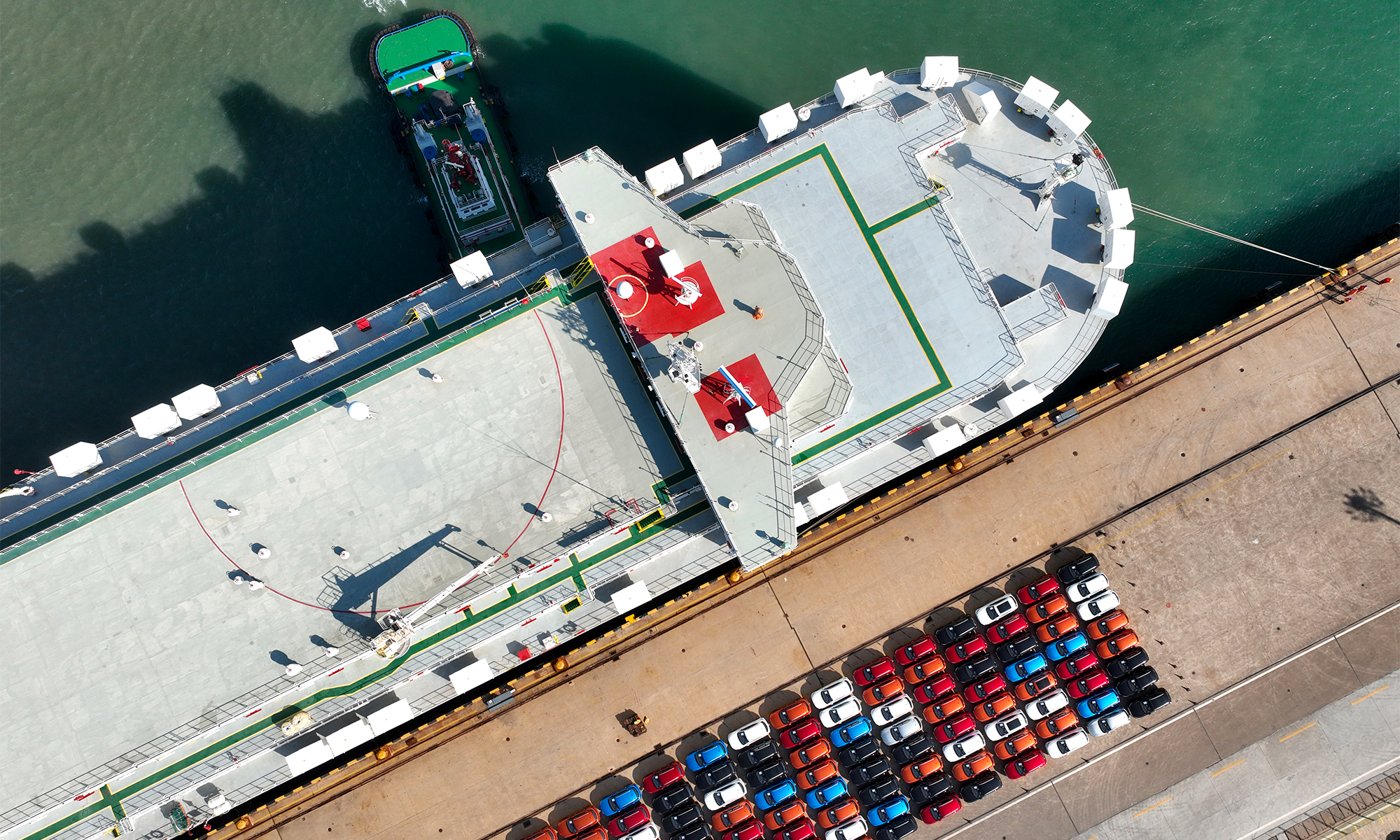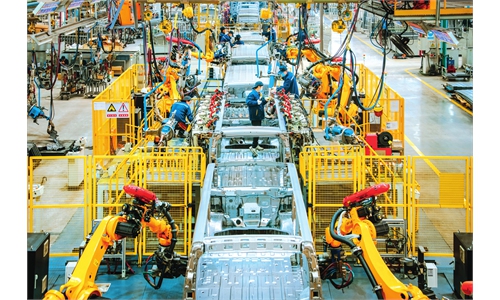Chinese automakers navigate global markets with own shipping fleet, showcasing nation’s manufacturing prowess
Domestic ships and surging vehicle exports highlight nation’s manufacturing prowess

A Ro-Ro ship docks at a berth and prepares to load vehicles destined for export in Lianyungang, East China's Jiangsu Province, on November 12, 2023. Photo:VCG
After China achieved the significant milestone of becoming the world's leading automotive exporter in 2023, many domestic auto giants have intensified their efforts to bolster overseas logistics by establishing their own shipping fleets as the new year begins. This strategic move, which combines domestically built ships with the surging vehicle exports, has vividly showcased the nation's unrivalled manufacturing prowess.
Chinese automakers, including BYD, SAIC Motor, Chery Automobile, GAC Group, are actively establishing their overseas fleets, Global Times reporters have learned. Experts said on Tuesday that the auto industry is entering a new era of "independent shipping," and "going abroad" will be the next breakthrough for the industry in the next decade.
Commencing a new voyage
BYD, which overtook Tesla to become the world's biggest electric car company in the final quarter of 2023, officially inaugurated its first vehicle carrier in January, named the BYD Explorer No. 1, according to a statement the company sent to the Global Times on Tuesday.
The vessel is 199.9 meter-long and has 7,000 standard parking spaces. BYD has another seven Ro-Ro vessels due to enter service over the next two years.
In the future, BYD will have more transportation capacity to facilitate the export of cars overseas. Its fleet, while serving the company's own delivery needs, will also open service for other auto exporters, the company said.
SAIC Anji Logistics, a subsidiary of SAIC Motor, has built the largest self-owned fleet of automobile enterprises in China. Its car carrier SAIC Anji Sincerity, which stands out as the world's largest LNG dual-fuel ro-ro ship currently in operation, completed its maiden voyage in January.
This 200-meter-long, 38-meter-wide, 13-story-tall giant vessel has 7,600 parking spaces, SAIC said in a statement sent to the Global Times on Monday.
With 31 car carriers, Anji Logistics has opened seven international routes, including Southeast Asia, Mexico, western South America, and Europe. Over the next three years, a total of 14 ocean vessels of varying scales will be integrated into its fleet, facilitating the rapid expansion of Chinese domestic brands across the seas, the company said.
Anji Logistics has also developed into the world's largest automotive logistics company, pioneering a multimodal transport system integrating road, rail and waterways. Its businesses span nearly 600 cities domestically and over 100 countries and regions overseas, with an annual shipping volume reaching tens of millions of vehicles.
Recent years have witnessed a surge in the ocean freight demand, driven by both the pandemic and geopolitical tensions, leading to soaring transportation costs. In the meantime, China's automotive exports are experiencing rapid growth, experts said.
Charter rates remained at all-time highs, with support from record trade volumes, including surging long-haul Chinese exports. Since 2019, global seaborne car trade in car equivalent unit-miles has grown by 19 percent, versus a 1 percent expansion in fleet capacity. By the end of 2023 the one-year time charter rate for a 6,500-car equivalent unit car vessel stood at a record $115,000 per day, having remained above $100,000 per day since late 2022, according to a report released by Clarksons Research in January.
"Establishing fleets enables automotive companies to not only reduce their own transportation costs but also capitalize on the lucrative profits from the current high-demand, low-supply ocean freight market," Zhang Xiang, director of the Digital Automotive International Cooperation Research Center of the World Digital Economy Forum, told the Global Times on Tuesday.
Moreover, it allows for expedited transportation scheduling and ensures higher quality assurance in the shipping process, Zhang said.
Peerless manufacturing
The bolstering of China's shipbuilding capabilities has empowered Chinese automakers to establish their own fleets. This not only showcases the strength of Chinese automotive companies but also underscores China's robust manufacturing capabilities and economic resilience, experts stressed.
China has maintained its position as the world's largest shipbuilding market for 14 consecutive years. In 2023, various indicators such as the volume of completed shipbuilding, new orders received, and backlog orders have all kept China's international market share at the forefront, according to data from the Ministry of Industry and Information Technology (MIIT).
The rapid growth in exports of Chinese automobiles, especially NEVs, has directly driven the demand for car carrier vessels. CIMC Raffles' production base in East China's Shandong Province has a filled production schedule for car carriers until 2026, according to a report by China Media Group (CMG).
Over the past two years, there has been a surge in global orders for Ro-Ro car carrier vessels, with approximately 200 additional orders. Notably, about half of these orders are from major domestic automotive companies in China, CMG reported.
Since 2021, China's automotive industry has demonstrated remarkable resilience, showcasing robust export performance.
In 2023, China's total automobile exports reached 4.91 million, growing 57.9 percent year-on-year, and the country is expected to become the world's largest auto exporter. Among them, exports of NEVs amounted to 1.2 million, surging 77.6 percent year-on-year, according to MIIT.
China has emerged as the world's largest single automobile market, leading to the development of high-quality automotive manufacturers and parts suppliers, Cui Dongshu, secretary-general of the China Passenger Car Association, told the Global Times.
Chinese automotive products have gained recognition not only domestically but also internationally, Cui said, noting that expanding into foreign markets is expected to drive growth in the automotive industry in the next decade.



